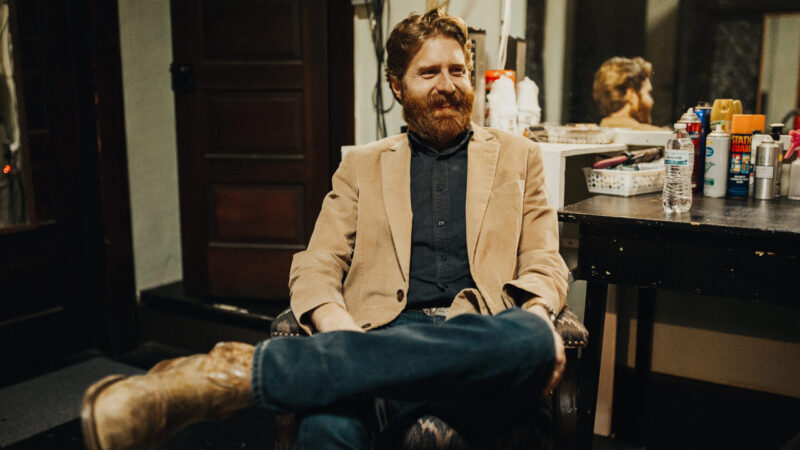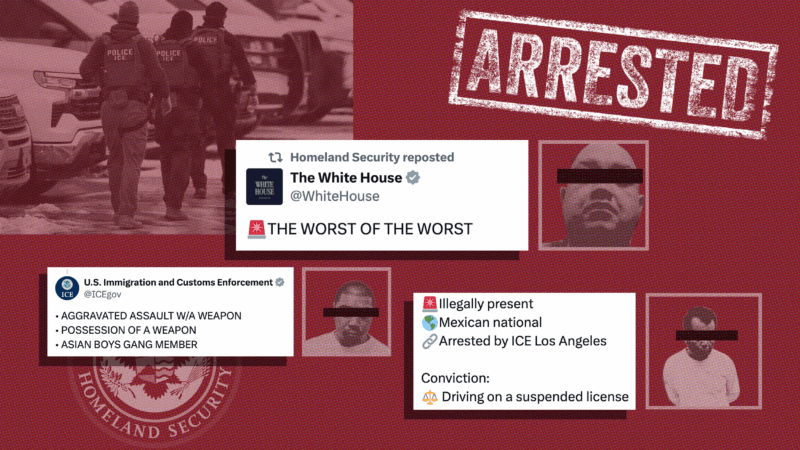One thing about unspeakable tragedy … you have to speak about it
September is National Suicide Prevention Month, and as part of our discussion of the topic at WBHM, we asked writer, musician, and storyteller Sean Dietrich to share a tragic experience from his childhood and how he’s found peace in the years after.
Below is an essay he posted on his website on September 14. It’s titled, “After Thirty Years.” Following the essay is a brief interview between Dietrich and WBHM’s Richard Banks.
Thirty years ago, it happened. 30 years ago. Thirty years ago, my whole life changed, and I thought I’d never be okay again.
It was a serene, late-summer day. I was a kid, playing outside, when the sheriff’s department cruiser pulled up to our house to deliver the news.
I remember my mother collapsing on the floor, sobbing. I remember, personally, going into shock when the preacher told me, “Your father took his own life.”
I remember feeling that upon this day, 30 years ago, nothing would be okay. Not ever again. I remember thinking that I would not survive my own childhood.
As I write this, I sit on a wide lake, watching autumn seize the world. The trees of Lake Martin are experiencing the first pangs of fall. There is a slight chill in the air. A woodpecker nearby is seriously attempting to give himself a concussion.
Sitting on the lake is a good place to think. Namely, because you don’t hear much of anything except the ringing in your own ears.
You only hear black-billed cuckoos, northern flickers, American kestrels, or a humble American crow. You hear the soprano section of starlings, or the flapping of a heron’s wings.
Right now I see a few ducks in the faroff, swimming. Mallards, with brilliant green heads. A male and female. The female duck is, evidently, trying to drown the male. They are quacking and clacking for their lives. Although, it just occurred to me that these ducks are not trying to kill one another. I think they are mating, which is all the same in the end.
And I’m wondering what the next 30 years of my life is going to look like.
This life hasn’t turned out at all like I thought it would. It has been a most wonderful adventure. It has confused me. It has moved me. It has entertained me. It… has hurt me.
My own life, like anyone else’s, has been an ongoing tale, filled with a cast of characters who are beautiful, sincere, and sometimes bat-dookie crazy.
And my own character has changed throughout each chapter. In fact, I wouldn’t even recognize the kid I used to be. I don’t even know who I am anymore.
In the last 30 years I’ve learned things. I have cried a lot. Laughed a lot. I have enjoyed certain moments, endured others.
And through it all, I have come to believe one thing. I have found a way to sum up the whole of my personal beliefs.
I believe there is a driving force behind the universe that keeps it going. It lies in the soil, drifts in the air. It’s in the water, and in every living thing. It causes flowers to bloom, mountains to move, and people to grow. And in your darkest days, it is a balm to the heart.
And it’s love. Just love. That’s it. In fact, I can attach no more feeble, human words to the definition of this profound force except to call it the “Grace of God.”
And I have you to thank for that, Daddy. In a way, your suicide was what introduced me to this intense love.
I am the same age you were when you chose to exit this world by your own hand. And I can say proudly, perhaps for the first time in my life, that I’m doing okay.
Published with permission.
Sean, you mentioned at least 2 things in your writing that you say changed your life: your father’s suicide and your writing. Talk about how they changed you and what you’ve learned through those experiences, especially when they intersect.
The two have almost become synonymous, my father, in my writing, because at this stage of my life, my father’s suicide exists within my writing. The writing became not just a therapy, I would call it more of a surgical tool, and that when someone dies, in any way — probably, especially with suicide — in my experience there’s a lot of infection that comes along with it. And that infection if it’s not [dealt with] it turns into a puss, and it begins to build. If you don’t release it, that infection will eat you alive. And so, surgically, when you’re writing, you begin to deal with the outside portion of it and you work your way inward. And after a certain amount of time, you will realize that this infection no longer has power over you.
In many circles, we don’t often talk about suicide. How does your sharing of your experiences play into your public appearances and do people come to you to discuss the topic before or after?
The interesting thing about it is, you don’t talk about it, because of the social taboos, and that’s extremely normal in a civilized America. They don’t talk about what they don’t want to exist, and when you’re sharing it with someone and you have this brain-link, mind connection, then you know it’s really [powerful], you know, it’s real. You experience certain emotions, you experience the good and the bad, and you get deeper into what you’re really experiencing, what you did experience. And that is probably the most effective form of therapy I’ve ever experienced with another human being.
If I had one little PSA to give to anybody dealing with the subject of suicide in their own personal life, it’s four letters: T-A-L-K. Just talk. Talk about it. Talk to yourself, if you have to. Talk to the ceiling. But the more you talk, the better it will get. And it seems so simple. But if you try it, you’ll find that it’s true.
And this is a tough topic. You write about coming up in a fundamentalist Christian background. I have a similar, upbringing, at least from my early years. Fundamentalism can often exclude people, such as, LGBTQ people, and that can lead to isolation. Talk about how to deal with that exclusion and how you reach out to those sometimes excluded groups, especially when it comes to sharing your thoughts on life, and a life like yours, and how it can get better.
I grew up in an extremely fundamentalist way of life, and I would argue almost that fundamentalism is really just a club designed to exclude, because there’s no greater feeling, no greater high for some people than to enjoy the feeling of being exclusive. And so I grew up in this way. Absolutely grew up this way.
My father passed away. There was a huge stigma that that fell over my family, because the whole community was fundamentalist. The way he died was extremely awful, and there was a lot of violence involved in his last night on Earth. He tried to kill me, and my sister, and my mother.
And this became public knowledge. It was on the front page of the little newspaper. This was all known. So, everybody knew this about me, and yet this was not something you talk about. It’s not something you address.
So, I remember going to church that first time. I remember people shifting away from my mother in the pews, and I remember going to school. I remember people on the bleachers shifting away from me, and on the bus I sat alone. I remember this feeling of being blackballed. The teachers would not speak about it. No one would speak about it.
I’ve had people find me after all these years, after 30 years, and reconnect with me. Kids that I grew up with, say ‘I’m sorry I never said anything to you. I’m sorry, I just, I, I dropped out of your life.” And yet I understand it.
I really do, and I don’t hold it against anybody. We would rather shun what we don’t want to deal with. We would rather ignore what we don’t understand.
But nowhere is this more damaging than in a place that is supposed to be a hospital — which I would say a church could function as a hospital — than to have a club, where in certain people are involved and the other people are put outside the walls.
At my father’s funeral, there was a preacher. He had been the most fundamentalist Bible beating, browbeating, dragon fire, brimstone preacher there was, and he had a problem. It came to light during my father’s lifetime. It was found that he had been having an affair, of questionable nature, and that he stole money from the church. And they booted him out, and his life went down the gutter. This man was reviled by that community. No one had seen him. No one knew where he was.
On the day of my father’s funeral, he stood in that receiving line to come pay his respects, but he didn’t come to speak to my mother, and he didn’t come to speak to many of my father’s relatives or anybody in the church. I could see everybody looking at him and whispering.
“Oh, there he is. Oh my gosh, there he is, we haven’t seen him in years.”
He’d come to speak to me. He came through the line. Brother Ernie was his name. He shook my hand, and there were tears in his eyes, and he said, “There’s only one unforgivable sin, and that’s not to love your neighbor.”
And he walked right out of the room and everybody followed him and pointed at him. And I remember thinking, about those words, I think about them every day.
One unforgivable sin, that’s not to love.
Parents, are you sure your kid’s car seat is installed right? Here’s how to know
In this visual guide, certified car seat experts walk through common installation mistakes and how to fix them. Learn what a secure car seat base and a tightly fastened tether look like and more.
Trump announces ‘major combat operations’ in Iran
Israel and the U.S. have launched strikes against Iran, with explosions reported in Tehran and air raid sirens sounding across Israel.
Trump says he is ‘not happy’ with the Iran nuclear talks but indicates he’ll give them more time
U.S. President Donald Trump said Friday he's "not happy" with the latest talks over Iran's nuclear program but indicated he would give negotiators more time to reach a deal to avert another war in the Middle East.
Bill Clinton says he ‘did nothing wrong’ with Epstein as he faced grilling over their relationship
Former President Bill Clinton told members of Congress on Friday that he "did nothing wrong" in his relationship with Jeffrey Epstein and saw no signs of Epstein's sexual abuse as he faced hours of grilling from lawmakers over his connections to the disgraced financier from more than two decades ago.
How the federal government is painting immigrants as criminals on social media
Experts say this kind of media campaign is unprecedented and paints a distorted picture of immigrants and crime
Pentagon puts Scouts ‘on notice’ over DEI and girl-centered policies
After threatening to sever ties with the organization formerly known as the Boy Scouts, Defense Secretary Hegseth announced a 6-month reprieve








